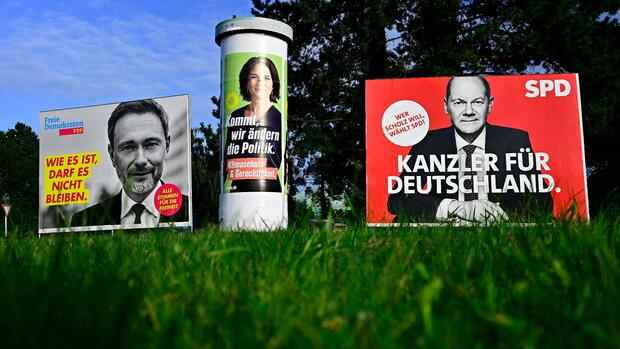For a traffic light coalition, compromises between the parties would be necessary.
(Photo: imago images / Udo Gottschalk)
The election result is clear. The winners are the SPD, Greens and FDP. These parties must form the next federal government under the leadership of Olaf Scholz. The numbers do not allow any other conclusion.
A Jamaica coalition may be mathematically possible, but it contradicts the political realities. The Germans do not want to see CDU boss Armin Laschet in the chancellery and Friedrich Merz in the cabinet. This overly clear message will still reach the Greens, despite all the advances that are now being made by the Union.
The traffic light is not a sure-fire success. There are major differences, especially on economic policy issues. Not between the SPD and the Greens, whose programs are largely congruent. But with its demand for massive tax cuts while at the same time adhering to the debt brake, the FDP seems to be on a fundamentally different course. But on closer inspection, there are a number of golden bridges that one can now walk across.
A first example is the share pension. This idea of the FDP is correct, also in order to keep a central promise of Scholz – stable pensions – in the long term. But there is more to it.
Top jobs of the day
Find the best jobs now and
be notified by email.
Because to implement the concept, the FDP proposes the establishment of a state fund. This should be allowed to take out loans in order to invest them at higher returns in a global equity portfolio.
Compromises are possible
Such a financial transaction is fully compatible with the debt brake because the state acquires property titles. But if such a vehicle can be created for retirement, then it can also be used to finance infrastructure projects, as the Greens are calling for.
The author is Professor of International Economics at Heinrich Heine University in Düsseldorf.
(Photo: imago images / Jürgen Heinrich)
Further compromises are possible. Just a few months ago, Christian Lindner was campaigning for low corporate tax rates. That should encourage more private investment. But for the state this is expensive and not very targeted, because it relieves all companies, regardless of whether they actually invest more or not.
In the past few days, Lindner has therefore turned around. Instead of lower tax rates, he now called for improved depreciation conditions for investments in digitization and climate protection.
This way is actually the better one – and can be connected to a traffic light. Because as finance minister, Scholz has already used this instrument in the Corona stimulus package and there is nothing against doing it again.
Of course, many construction sites remain: Can the complete abolition of the Solis be embedded in a major tax reform with a moderately higher top tax rate? Can the already unworkable wealth tax be cleared away in favor of a fundamentally reformed inheritance tax? This and more will provide topics of conversation for many nightly exploratory rounds.
But everyone involved – red, green and yellow – want to govern. And it must be clear to them that respect for the will of the voters formally requires that they do this together.
More: Climate investments, share rents – what could be expected from possible coalitions
